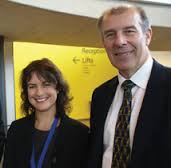The second PaS (Police and Security group initiative) was like the first – at City Hall, the home of the Mayor of London, it was both a chance to hear about the good and fast-evolving work between police and private security partners, and a forum for sharing of best practice and ideas, writes Mark Rowe.
Pictured are DI Georgie Barnard of the Met Police business crime reduction hub, an opening speaker at the event on Wednesday, November 25; and the PaS lead, Geoff Zeidler. Other speakers included Hannah Wadey, operations director of the Safer London business partnership; Tony Holyland, head of quality and standards at the regulator the Security Industry Authority; and Charlie Gordon-Lennox, CEO of The Keyholding Co, and Michael Wright, co-ordinator of Safer Jewllery, on the recent work against smash and grab robberies on jewellers and other high-end retailers, which has included demos of a ‘smash and grab’ raid by masked men on motorcycles, as featured in the December 2015 print issue of Professional Security magazine.
As at the first event a year ago there were case studies; from the West End, and Clapham, south of the river. While the New West End Company, the umbrella body that covers the ORB (Oxford, Regent and Bond Street), is employing patrollers as link between retailers, shoppers and the police, Clapham has Friday and Saturday night marshals for the thousands of pub, club and restaurant-goers. In London and beyond, private firms are contracted to provide taxi marshals or other ‘capable guardians’ at peak times; street pastors offer help for people who might have had too much to drink and are vulnerable. The speakers from Clapham were Jeremy Keates of This is Clapham BID; Malcolm Nicol of Assist Security, the Wimbledon-based contractor that in August 2015 was awarded the contract to provide the Clapham BID (business improvement district) with wardens on Friday and Saturday nights; James Barrett of Safer Lambeth business crime reduction partnership; and from the Met Police, Sgt Tony Jarred. They pointed to how Clapham is bringing together several elements – a ‘hub’ at Clapham Methodist Church that hosts a Friday 8pm briefing for those managing the local night-time economy, besides a place for night-goers to get a cup of tea or help, which saves visits to the NHS accident and emergency; the wardens acting on low-level anti-social behaviour and nuisance and passing on more serious incidents to police; and the door and security staff of venues linked by radio and, after closing time, some (paid for by their venues) putting on identical red jackets to stand at strategic points, typically street corners, to enforce ‘quiet streets’, to help night-goers on their way without causing trouble with local residents, typically by shouting or urinating.
Police and the BID could point to good outcomes; fewer reports of assaults and other crimes arising from Friday and Saturday nights out; and fewer complaints from residents.
In the Clapham and West End cases alike (and in the case studies of a year ago, from Canary Wharf and Camden), speakers stressed how such partnerships arose thanks to the enthusiasm and hard work of those on the ground, building up trust and showing the benefits of such work. Clapham for example has reckoned that the hundreds of people treated at the ‘hub’ has within a year saved the National Health Service £100,00o in fewer calls on hospital A&E services.
Deputy Mayor for Policing and Crime Stephen Greenhalgh, Jonathan Glanz the West End ward councillor and adviser to the Mayor’s Office for Policing and Crime (MOPAC) and for the Met Police Det Supt Iain Raphael also spoke at the event, to back the PaS idea.
As at other similar events, one topic was how best and who police and private security should contact, whether to pass on details of crimes, intel, or to share intelligence on common issues. Police and private businesses alike spoke of it sometimes being hard to know who to contact, and what the other side wanted; and even if they made the right contact, it might change as personnel moved. The Met business crime reduction hub was given as the place to go to – email [email protected] – that the Safer London business partnership is based with. As a sign of how – inevitably? – fragmented and imperfect the landscape is, Safer London however is far from working in all London’s 32 boroughs.
More words and pictures in the January 2016 print issue of Professional Security magazine.
For more about PaS, visit https://www.london.gov.uk/pas-police-and-security-initative-launch.
Contacts:
Visit www.bsia.co.uk/police-and-security. For MOPAC (which sets the budget for the Met on behalf of the Mayor) visit https://www.london.gov.uk/what-we-do/mayors-office-policing-and-crime-mopac. For Safer London, the crime reduction scheme, visit http://www.saferlondon.co.uk/.










